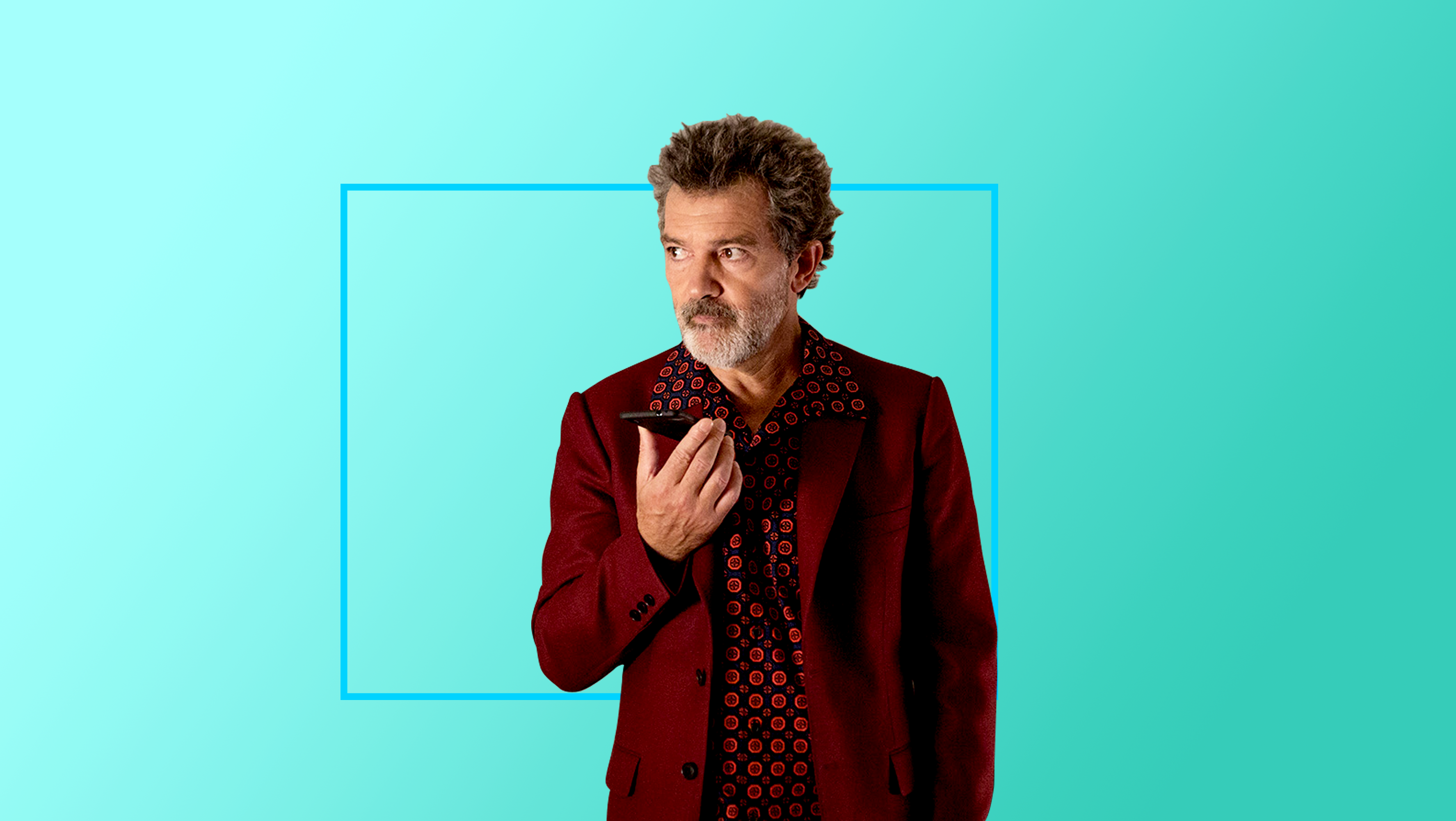God, how I long to have tea and heroin with filmmaker Pedro Almodóvar. We’d look at art and flip through the books that fill his beautiful home in Madrid. We’d talk of cinema and music, of Jean Cocteau and Chavela Vargas, of sorrow and love. And we’d talk of dead mothers. What a glorious afternoon swapping stories it would be, laughing and crying as the sun slowly sets.
As it turns out, I did have a chance to experience something of the kind watching Almodóvar’s latest masterpiece, the autobiographical Pain and Glory, his most personally revealing film to date. It moved me deeply.
The film tells the story of a famous filmmaker, Salvador Mallo, who is depressed. He suffers from severe, chronic back pain and a host of other ailments—from tinnitus and dysphagia to insomnia—all detailed in an explosion of riotous graphics. Aging and illness have forced the director to retreat from life. A man used to being in control is now unable to work. He cuts himself off from friends and colleagues. Hidden in this sepulchral existence—he prefers to live in semi-darkness because of frequent migraines—are powerful, unacknowledged feelings like regret, guilt and grief.
A chance encounter leads to Mallo’s first halting step forward. The director reconnects with his former leading man, actor Alberto Crespo. The two haven’t spoken for 32 years. Mallo never forgave Crespo for playing a role the way he wanted to and not as the director had intended in a hit that made them both stars. Mallo even banned Crespo from attending the premiere all those years ago.
This is all very meta. The director is played by Antonio Banderas (a beautifully restrained performance that won him best actor at Cannes), one of Almodóvar’s stable of actors who regularly appeared in his early films. But Banderas left for Hollywood in 1989 and it’s rumored that Almodóvar never forgave him. The two wouldn’t work together for another 22 years, not until 2011’s The Skin I Live In. Adding to the self-references: the set for Mallo’s home is actually Almodóvar’s apartment, and Banderas is wearing Almodóvar’s clothes. Granted, all of Almodóvar’s films are autobiographical to some extent, but this one more so.
“Pain and Glory illuminates what filmmaking means to Almodóvar and what it means to age as an artist.”
Pain and Glory illuminates what filmmaking means to Almodóvar, and why he does what he does. It is also about aging as an artist—how Almodóvar, who just turned 70, is still able to create.
Mallo and Crespo (a sexy Asier Etxeandia) first reconnect over tea and heroin—Crespo is a regular user, Mallo a novice. And so addiction joins Mallo’s repertoire of bad realities. “Addiction” is also the title of the story within the story, a “confessional” text written by Mallo, about a lover lost to heroin addiction in the 1980s, that Crespo wants to stage for the theatre.
Pain and Glory moves seamlessly among the contemporary drama, the staged text and memories of Mallo’s childhood to build a beautiful and moving depiction of a man battling the betrayal of time on his body and spirit.
Sure, the man is a great artist, a brilliant mind—he owns works by Spanish painter and sculptor Guillermo Pérez Villalta and reads novels by overlooked Norwegian author Torborg Nedreaas—but his predicament is universal.
The film has a particular resonance for gay men of a certain age, those of us who are childless except for the progeny of our work or the trappings of a wonderfully curated life; the perfectionists and obsessives who, as we age, allow self-satisfaction to tip over into inertia, when complaints blot out the present and the past becomes more important than the future.
![]()
How do we aging gays go on living?
Almodóvar suggests an answer with great gentleness and grace. I choose the latter word consciously. I want its religious connotation because, not surprisingly, a Spaniard confronting his mortality can’t help but rely on religious themes and Catholic imagery. But Almodóvar is an avowed atheist. He loves the shape and form of Catholicism, not the content—and never the church. Pain and Glory depicts the film director as a god, indivisible from his creation, his stories, his word. The film is about art and religion, art as religion. It’s about communion and redemption.
In the beginning was the word, and the word was female. In the 1995 book, Almodóvar on Almodóvar, the director said all his films trace back to the gossip of women. Pain and Glory opens with Mallo floating underwater, seemingly to provide relief from back pain. It’s a watery beginning—a womb perhaps? The film then cuts to a scene from Mallo’s childhood, an impossibly sylvan setting with his mother (the ever lovely Penélope Cruz) washing bed linens in a stream alongside three other women. They are all talking playfully together while young Salvador, astride his mother’s back, listens. Then the white sheets are spread out on the tall grass in the sun as the women break into song. The boy watches with unalloyed joy.
The white sheets become the whitewashed walls of his childhood home (it’s a cave: Calling Plato!), and then the white exterior walls onto which movies are projected in this small town, which become the white pages of film scripts on which the boy will write his own story, over and over, always aching to recapture that childhood idyll.
But Mallo is a man in late middle-age. Too many betrayals, his and others, stand between him and such simple joy. Isn’t that what aging is: A series of betrayals of your younger self?
![]()
Spoiler alert: I want to talk about mothers, Mallo’s and Almodóvar’s—and mine. Now, it’s not that much of a spoiler to say that this film revolves around the mother. So many of Almodóvar’s films do. Nearly all of them feature someone much like Almodóvar’s real mother: A poor, religiously observant woman trying her best to provide a loving home in a tiny backwater of Spain. But Pain and Glory turns on one small scene that sneaks up on viewers late in the film. I need to talk about it. Just thinking about it makes me teary-eyed.
Mallo is a smart, observant man. He can’t escape his feelings, heroin notwithstanding. And his greatest regret is betraying his selfless but guilt-wielding mother—a potent combination, I know. He couldn’t save her from dying, naturally, but neither could he deliver on his last promise, her last wish to allow her to die at home.
“How many of us carry that raw, aching wound? That our queerness is a disappointment to our parents”
But there’s more. On top of the gradual abandonment with which most children wound their parents as they move away to start a new life, the film suggests something worse. Mallo’s gayness is a betrayal, too. “Mama, I’m very sorry I was never the son you wanted,” says Mallo fighting back tears. “I’ve failed you, simply by being as I am.” How many of us carry that raw, aching wound? That our queerness is a disappointment to our parents, loving and supportive as they may or may not be? I carry it.
The final scene between Mallo and his mother (played in her old age by the amazing Julieta Serrano) has dialogue lifted almost directly from the last 24 hours of Almodóvar’s mother’s life (she died in 1999). In the movie, mother and son both divulge guilt at somewhat crossed purposes. There is no resolution; there is no answer. There might be forgiveness. There is certainly great love, which is anything but simple. The scene just is: Mother and son separated by a vast gulf, sitting together. But the scene is also a story that Mallo is telling a friend (as Almodóvar is telling us). That’s it, that’s grace. He has opened himself up to his feelings and to others. He is redeemed. He can create, take risks and make movies that evoke a child’s capacity for love, wonder and beauty.
And so can we. Openness, vulnerability, curiosity, community—that is how we age.
Finally, there is another grace note in the film that I won’t spoil: a talisman of first love, a small work of art that at last finds its way to its intended owner, as if guided by some hidden hand. Whose… God’s? Almodóvar’s? The viewer’s? Does it matter as long as the story connects?
Just like this movie when it found me. I felt lighter when I came out of the theatre, less wounded, more alive.
Pain and Glory opens Fri, Oct 4 across the US and Fri, Oct 18 in Toronto, Vancouver and Montreal.


 Why you can trust Xtra
Why you can trust Xtra


